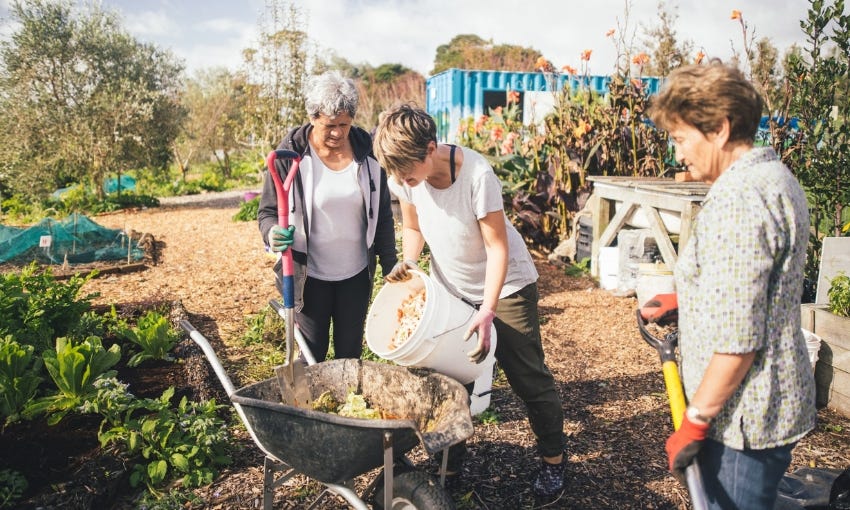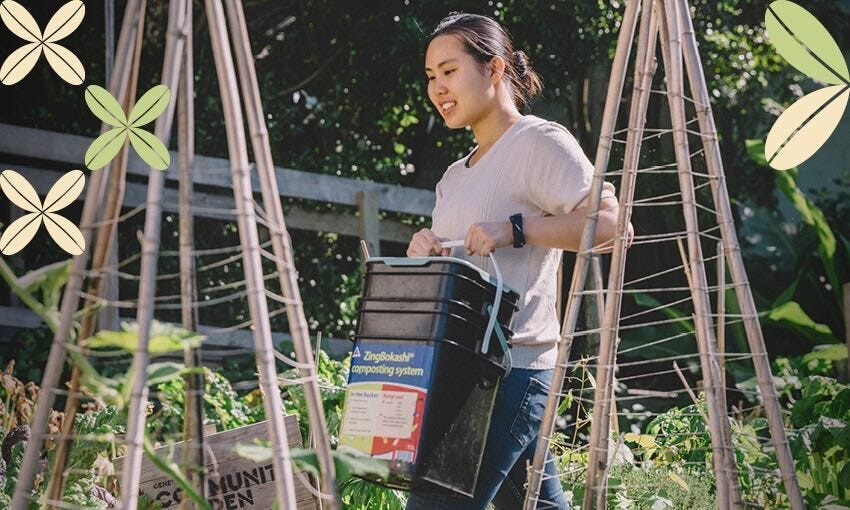Why you should make composting a priority
“It's fun. And it's beneficial for yourself and for your community and for the planet.”
Kia ora, welcome to Future Proof brought to you this week by the Compost Collective. I’m Ellen, thanks for joining me.
Image credit: Compost Collective.
Adam Ben-Dror had never taken much notice of composting. But once he got involved in growing veggie gardens, the interest in transforming food scraps into garden gold came naturally.
The first time he gave it a go was surprisingly profound: “It was the first time I saw a loop being closed,” he says. “The first time that I saw in a really clear way that this waste wasn't going somewhere else. I was able to transform it.”
Now a tutor at the Compost Collective, Ben-Dror is a keen composter, worm farmer and food grower. And he reckons everyone can – and should – make the magic of composting a part of their daily lives.
“It can be a really low time and energy and brain commitment,” Ben-Dror says. In its simplest form, he explains, you layer up some food scraps (greens) with leaves or shredded paper or cardboard (browns), in about a 50/50 ratio. “As long as you're getting that ratio about right, as long as it doesn't get too wet or too dry, then you can't go too far wrong.”
"Why not just put your food scraps in the rubbish?", you may be wondering. Food scraps sent to landfill release planet-heating methane gas, which is 28 times more potent than carbon dioxide. Plus, nutrients are lost. Essentially, food scraps are valuable, and chucking them away is a wasted opportunity to give our soils a health boost.
Auckland’s new dedicated kerbside food scrap collection – which takes waste to a digestion facility near Rotorua – is a step in the right direction, Ben-Dror says, since the food isn’t going to landfill. Given the choice, Ben-Dror would pick composting over the kerbside bin. “I get to benefit from the compost, my community benefits, and I can grow food.”
Even if you personally aren’t a grower, your food scraps can fuel the compost of other gardeners in your community through the ShareWaste app. They can fuel social connections too: “The composting and growing community in Auckland is such a rich place,” says Ben-Dror. “Community gardens are absolute treasures. They're just like these little oases of calm and community and food.”
Go further down the composting wormhole and you’ll find a sense of deep satisfaction, says Ben-Dror – the kind that comes from making something with your own two hands (and your apple cores and banana peels). “You can watch it changing and transforming… in the same way that a plant is alive, a compost heap is alive.”
Ultimately, the humble compost heap is a gateway to connecting with nature.
“We're very disconnected from this fundamental process that happens on the planet. And it's kind of unnatural to be disconnected. So it's like coming home, engaging with this process that just takes place on the forest floor. That's what happens when organic matter falls off of trees. Starts decomposing. It's us re-entering the cycle of aliveness.”
There’s a composting solution to suit your lifestyle and commitment level – whether you’re on a lifestyle block in the wop-wops or cosied up in a city apartment. If you get stuck, there are also plenty of people who are keen to help, like Ben-Dror and the folks at the Compost Collective.
Turn waste into gold for your garden
Composting is easy once you know how, and you can learn all the ins and outs at Compost Collective's free workshops, and even become a ShareWaste NZ composter for your community.
Make the most of your waste with free composting workshops and advice at compostcollective.org.nz.
Is asking banks to stop funding fossil fuels working?
Years of pressuring banks to divest from fossil fuels is paying dividends. Spinoff writer Shanti Mathias covers research from 350 Aotearoa tracking New Zealand banks’ financing of fossil fuels, which finds that divestment tactics have led to a near-universal commitment by banks to stop funding thermal coal projects. What can consumers do? Switch to a fossil-fuel-free bank, and tell your old bank why you’re making the switch, says 350 Aotearoa campaigner Adam Currie.
Scientific societies ‘highly concerned’ by fast track legislation
Ten societies representing thousands of scientists have written an open letter to the government, urging them to slow the pace of fast-track legislation and consult widely. “Your government has proposed a range of changes to environmental legislation that are not responsive to the dual biodiversity and climate crises, that undermine rather than sustain the natural capital upon which the economy is dependent, and which will take us backwards without sufficient protections in place,” the signatories write. The scientists join a raft of environmental groups in sounding the alarm about the bill, despite Chris Bishop telling reporters there had been “extensive engagement” with the environmental movement. Last week, Hayden Donnell could not find a single environmental organisation which felt they had been consulted. If you’re not up to speed with what the fast track bill entails, Newsroom has an explainer from two lawyers and Jack Tame interviewed Chris Bishop about the legislation on Q&A.
It’s cheaper to go electric
Switching from gas appliances and a petrol vehicle to all-electric plus home solar panels would save Kiwi households up to $4,500 a year, a new report finds. New Zealand is one of the first countries in the world to reach “an electrification tipping point”, where it’s cheaper to go electric rather than stick with the fossil fuel status quo. The report urges the government to help all New Zealanders finance the switch.
Right now, we need your support more than ever
The Spinoff recently estimated that the number of full-time journalists in New Zealand may have halved since 2018 Census data was published. As the media landscape continues to change, numbers may decrease again. The Spinoff is not immune to the drastic advertising slowdown impacting the sector. That’s why we’re immensely grateful to our audience for their support. To those who already support us, thank you. If you don’t and are able, we’d be very grateful if you’d consider becoming a Spinoff member or donating today.
– Duncan Greive, Founder
More stories
Cleaning streams and diverting fish from landfill: James Borrowdale profiles two of Auckland’s community groups.
The Associate Environment Minister has walked back a communication to councils advising them to ignore biodiversity mapping rules, after legal experts suggested the directive was unlawful.
Pacific Islanders’ traditional knowledge should play a significant role in sustaining communities as the climate changes.
New South Wales becomes the first state in Australia to ban oil and gas drilling and mining in its coastal waters.
Would you eat snake meat? A new study suggests that farmed python meat could offer a less carbon intensive option than traditional animal protein choices.
These scientists are investigating an “insane” plan to save the Arctic’s sea ice.
In-person facilitated conversations can help overcome political polarisation on climate change.
Record sea and land temperatures have some scientists worried that climate change is accelerating, but others reckon the trends are in line with predictions.
Watch now: Meet three Pacific K-pop fans
Directed by Litia Tuiburelevu, K-POLYS is a one-off documentary that presents intimate portraits of three Polynesian K-pop fans: Boba, Ethan, and Ashley. All three are part of the K-pop fan community in Tāmaki Makaurau. It’s one of many that have sprung up worldwide as K-pop has gone from a musical genre in South Korea to a global cultural phenomenon. Watch now on The Spinoff.
Made with the support of NZ On Air.
Fergus the Tasmanian devil.
To finish this issue, I’ve just returned from Tasmania, where the iconic Tasmanian devils are under threat from facial tumour disease caused by two contagious cancers. A promising new vaccine, similar to some Covid-19 vaccines, is under investigation. Now that I’m back home, I’m looking forward to getting stuck into Tāmaki Makaurau’s EcoFest, with its extensive programme of events that offer all sorts of ways to learn more about the environment and sustainability.
Have a devilishly good week,
Ellen
Future Proof is looking for a sponsor!
Connect your brand with an insightful exploration of environmental news, reaching influential readers committed to sustainability and staying informed about the state of our natural world. Contact commercial@thespinoff.co.nz to learn more.
Got some feedback about Future Proof or topics you’d like covered? Get in touch with me at futureproof@thespinoff.co.nz











